
Revista Educacion en Ingenieria
Scope & Guideline
Elevating Educational Standards in the Engineering Community
Introduction
Aims and Scopes
- Innovative Teaching Methodologies:
The journal emphasizes the exploration and implementation of innovative teaching methodologies, such as gamification, project-based learning, and remote teaching, to enhance student engagement and learning outcomes. - Interdisciplinary Approaches:
There is a strong focus on interdisciplinary approaches in engineering education, integrating concepts from various fields such as social sciences, technology, and environmental studies to provide a holistic educational experience. - Technology Integration in Education:
The journal highlights the importance of incorporating technology in engineering education, including the use of online laboratories, educational apps, and digital tools to facilitate learning and adapt to modern educational needs. - Curriculum Development and Optimization:
Research on curriculum design and optimization is a core area, with studies addressing the alignment of educational programs with industry needs and the integration of practical skills into engineering curricula. - Research and Learning Assessment:
The journal addresses the importance of research-based learning and effective assessment methodologies to improve teaching practices and ensure that students acquire necessary competencies.
Trending and Emerging
- Gamification and Engagement Strategies:
There is a growing trend towards incorporating gamification and innovative engagement strategies in engineering curricula to enhance student motivation and learning effectiveness. - Impact of COVID-19 on Education:
Recent publications emphasize the effects of the COVID-19 pandemic on engineering education, exploring shifts to online learning, digital competencies, and the integration of ICT in teaching practices. - Sustainability and Social Responsibility:
An emerging focus on sustainability and social responsibility within engineering education reflects a growing awareness of the role of engineers in addressing global challenges, such as climate change and social inequality. - Research-Based Learning:
The emphasis on research-based learning is increasing, with studies showcasing methodologies that promote active learning through research activities and projects that connect students with real-world engineering problems. - Collaboration Between Academia and Industry:
There is a notable trend toward fostering collaboration between educational institutions and industry partners, aiming to better align engineering education with workforce needs and improve student employability.
Declining or Waning
- Traditional Teaching Methods:
There appears to be a waning interest in traditional teaching methods, such as rote memorization and lecture-based instruction, as the focus shifts towards more interactive and student-centered approaches. - Basic Technical Skills Training:
Topics centered around basic technical skills training have decreased, suggesting a move towards a more integrated and practical application of skills within project-based and collaborative learning environments. - Purely Theoretical Research:
Research that focuses solely on theoretical frameworks without practical application or connection to real-world engineering problems is becoming less frequent, indicating a preference for studies that demonstrate tangible outcomes. - Individual Assessment Methods:
There is a noticeable decline in studies that focus exclusively on individual assessment methods, as educational paradigms increasingly favor collaborative and peer-assessment strategies. - Narrowly Focused Case Studies:
The journal has moved away from narrowly focused case studies that lack broader implications, favoring research that addresses larger trends and issues in engineering education and its impact on society.
Similar Journals
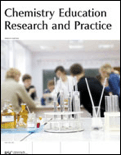
Chemistry Education Research and Practice
Elevating Chemistry Instruction with Rigorous ResearchChemistry Education Research and Practice is a prominent journal dedicated to advancing the field of chemistry education through rigorous research and innovative practices. Published by the Royal Society of Chemistry, this journal, with an ISSN of 1109-4028 and an E-ISSN of 1756-1108, operates out of Greece and has established itself as a leading voice in the intersection of chemistry and educational methodology. With a remarkable impact factor and ranking in the top quartiles (Q1) for both Chemistry and Education in 2023, it appeals to a diverse audience of researchers, educators, and practitioners who are passionate about enhancing chemistry instruction and learning experiences. The journal spans a wide range of topics, aiming to promote and disseminate high-quality research that informs pedagogical strategies, curriculum development, and educational policy. By providing a platform for vibrant discussions and new ideas, Chemistry Education Research and Practice plays a crucial role in shaping the future of chemistry education worldwide and continues to impact the academic community significantly.
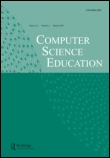
Computer Science Education
Connecting Theory and Practice in Computer Science EducationComputer Science Education is a prestigious journal published by ROUTLEDGE JOURNALS, TAYLOR & FRANCIS LTD, focusing on the critical intersection of computer science and educational practices. Established in 1988, this journal has become a cornerstone for researchers, educators, and practitioners interested in enhancing teaching methodologies and learning outcomes in computer science. With an impressive ranking within the top quartile (Q1) in both Computer Science (miscellaneous) and Education categories for 2023, as well as high Scopus percentile placements, it underscores its significance in advancing the discipline. The journal offers a platform for innovative research encompassing diverse educational environments and approaches, and while it currently does not offer open access options, it remains committed to disseminating high-quality scholarly work. As a vital resource for anyone looking to contribute to and understand the evolving landscape of computer science education, Computer Science Education continues to shape the future of learning in this dynamic field.
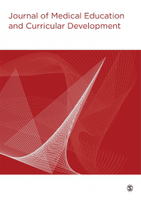
Journal of Medical Education and Curricular Development
Shaping the Future of Healthcare Through EducationJournal of Medical Education and Curricular Development is a pioneering open-access journal published by SAGE Publications Ltd, dedicated to advancing the field of medical education. With an ISSN of 2382-1205, this journal has been committed to providing high-quality, peer-reviewed research since 2014. It serves as a vital platform for educators, researchers, and practitioners interested in innovative teaching methodologies, curriculum development, and assessment strategies in medical education. The journal not only aims to disseminate impactful research but also encourages scholarly dialogue on best practices and emerging trends in the field. By offering unrestricted access to published articles, it ensures that knowledge is widely accessible, promoting collaboration and improvement in medical training worldwide. As a key resource for professionals and academics alike, it supports the ongoing evolution of educational practices that directly influence healthcare outcomes.

Pegem Egitim ve Ogretim Dergisi
Pioneering Research in the Heart of EducationPegem Egitim ve Ogretim Dergisi is a prominent academic journal published by PEGEM AKAD YAYINCILIK EGITIM DANISMANLIK HIZMETLERI TIC LTD STI, specializing in the field of education. Based in Turkey, this journal offers a platform for scholarly discourse, catering to both emerging and established researchers in the educational domain. With its ISSN 2148-239X, the journal aims to provide insights into contemporary educational practices, pedagogical innovations, and research findings that influence teaching and learning. Although classified in the Q4 quartile of the education category as of 2022 and achieving a Scopus rank of 1178 out of 1469, it remains a valuable resource for practitioners and academics alike. The journal ceased Scopus coverage in 2023, yet it continues to be a relevant outlet for educational research in Turkey and beyond. While it operates under traditional access models, the potential for collaborative research and knowledge sharing makes it a noteworthy choice for those engaged in the evolving landscape of education.
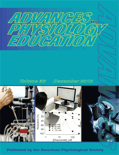
ADVANCES IN PHYSIOLOGY EDUCATION
Advancing the Future of Physiology EducationADVANCES IN PHYSIOLOGY EDUCATION, published by the American Physiological Society, is a leading journal dedicated to the field of physiology education, with a commitment to advancing teaching practices and pedagogical strategies in this vital discipline. Established in 1998, the journal has consistently provided a platform for original research and discussion, fostering the improvement of educational methodologies. With an impressive impact factor and ranked in Q2 for Education and Q3 for Physiology, it reflects a robust academic influence within the research community. The journal ranks #458 out of 1543 in Social Sciences - Education and #130 out of 193 in Biochemistry, Genetics, and Molecular Biology - Physiology according to Scopus, highlighting its critical role in shaping physiology education. While it operates on a subscription model, its focus remains on promoting innovative education practices that benefit both educators and students alike. This journal is essential reading for anyone looking to enhance their understanding of physiology teaching and learning.
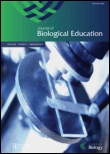
JOURNAL OF BIOLOGICAL EDUCATION
Innovating Biological Learning for Tomorrow's EducatorsThe JOURNAL OF BIOLOGICAL EDUCATION is a prominent academic journal published by Routledge Journals, Taylor & Francis Ltd, focusing on innovative research and practices in the field of biological education. With an ISSN of 0021-9266 and E-ISSN 2157-6009, this journal serves as a vital resource for educators, researchers, and students dedicated to enhancing the teaching and learning of biology. Since its inception in 1967, it has maintained a consistent commitment to promoting best practices and integrating new methodologies into biological curriculum design and pedagogy. The journal holds a respectable impact factor and ranks in the Q2 category for both Agricultural and Biological Sciences and Education, reflecting its influence and authority within these fields. Researchers are encouraged to engage with its diverse range of articles that address critical issues in biological education, showcasing cutting-edge research and practical approaches. Its reach is particularly significant in the United Kingdom and globally, making it a key platform for disseminating knowledge and fostering collaboration among professionals.
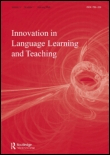
Innovation in Language Learning and Teaching
Unlocking Potential in Language Learning through Innovative Approaches.Innovation in Language Learning and Teaching is a premier peer-reviewed journal published by Routledge Journals, Taylor & Francis Ltd, focusing on the intersection of innovative practices in language education and teaching methodologies. With a notable impact factor reflected in its recent placement in the Q1 quartile for both Education and Linguistics and Language categories, this journal serves as a crucial resource for scholars and practitioners aiming to enhance pedagogical approaches and improve learning outcomes in language education. Spanning from 2009 to 2024, it showcases cutting-edge research that addresses contemporary challenges in the field, facilitating a deeper understanding of language acquisition, pedagogy, and curriculum development. The journal is indexed in Scopus, demonstrating its significant contribution to the academic community, with impressive ranks in both the Arts and Humanities as well as the Social Sciences categories. Although it follows a traditional subscription model, the journal is committed to disseminating high-quality research that fosters collaboration and discussion among researchers, educators, and students dedicated to advancing language learning and teaching practices.

Advances in Medical Education and Practice
Transforming Medical Education for Tomorrow's PractitionersAdvances in Medical Education and Practice (ISSN: 1179-7258, E-ISSN: 1179-7258) is a prominent open-access journal, published by Dove Medical Press Ltd since 2010, with a specific focus on the evolving landscape of medical education and training. Based in the United Kingdom, this journal aims to disseminate high-quality research and innovative practices that enhance educational strategies in medical and health professions, providing a platform for scholars, educators, and practitioners to share advancements that influence curriculum development, teaching methodologies, and assessment techniques. With impressive rankings in Scopus, positioned in the top quartile of educational journals (Q2 in Education, Rank #517/1543), and a respectable impact in the 66th percentile, it is a vital resource for those invested in enhancing the quality of medical education worldwide. Researchers, professionals, and students will find valuable insights in its comprehensive collection of articles, ensuring they stay at the forefront of advancements in medical education.
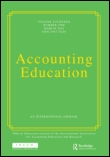
Accounting Education
Catalyzing Change in Accounting Education MethodologiesAccounting Education is a leading academic journal dedicated to advancing the field of accounting education, published by Routledge Journals, Taylor & Francis Ltd. With an impressive Q1 ranking in both the fields of Accounting and Education, the journal serves as a vital platform for educators, researchers, and practitioners interested in the evolving pedagogies and methodologies in accounting education. The journal’s focus is on disseminating high-quality research that addresses contemporary challenges and innovations within accounting teaching, supported by an extensive archive from 1992 to the present. While currently not open access, the journal is known for its rigorous peer-review process, ensuring that only the most impactful research is published. With its high Scopus rankings, including a notable 92nd percentile in Business, Management and Accounting, Accounting Education provides invaluable insights and fosters professional development, making it an essential resource for anyone committed to enhancing accounting education.
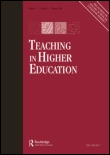
TEACHING IN HIGHER EDUCATION
Innovating the future of teaching in higher education.TEACHING IN HIGHER EDUCATION is a premier academic journal published by Routledge Journals, Taylor & Francis Ltd, dedicated to advancing the scholarship and practice of teaching within the higher education sector. With an ISSN of 1356-2517 and an E-ISSN of 1470-1294, this journal is widely recognized for its profound impact in the field, boasting a 2023 category rank of Q1 in Education, placing it in the top tier of educational research. Its commitment to fostering an inclusive and dynamic discourse on pedagogical methods and learning frameworks makes it essential reading for researchers, educators, and policymakers alike. Spanning topics such as student engagement, curriculum development, and innovative teaching strategies, TEACHING IN HIGHER EDUCATION aims to contribute to ongoing conversations and practical applications that enhance the educational landscape. While an Open Access option is not available, the journal maintains a robust readership, with its articles being rigorously peer-reviewed and disseminated to reflect cutting-edge research trends and practices in education.